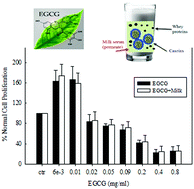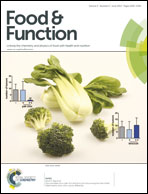Bioefficacy of tea catechins encapsulated in casein micelles tested on a normal mouse cell line (4D/WT) and its cancerous counterpart (D/v-src) before and after in vitro digestion
Abstract
Numerous studies have demonstrated that tea catechins form complexes with milk proteins, especially caseins. Much less work has been conducted to understand the metabolic conversions of tea–milk complexes during gastro-duodenal digestion. The objective of this study was to determine the significance of this association on the digestibility of the milk proteins and on the bioaccessibility of the tea polyphenol epigallocatechin gallate (EGCG). An in vitro digestion model mimicking the gastric and duodenal phases of the human gastrointestinal tract was employed to follow the fate of the milk proteins during digestion and determine the bioefficacy of EGCG isolated or encapsulated with the caseins. The samples, before and after digestion, were tested using two parallel colonic epithelial cell lines, a normal line (4D/WT) and its cancerous transformed counterpart (D/v-src). EGCG caused a decrease in proliferation of cancer cells, while in normal cells, neither isolated nor encapsulated EGCG affected cell proliferation, at concentrations <0.15 mg ml−1. At higher concentrations, both isolated and encapsulated produced similar decreases in proliferation. On the other hand, the bioefficacy on the cancer cell line showed some differences at lower concentrations. The results demonstrated that regardless of the extent of digestion of the nanoencapsulated EGCG, the bioefficacy of EGCG was not diminished, confirming that casein micelles are an appropriate delivery system for polyphenols.


 Please wait while we load your content...
Please wait while we load your content...